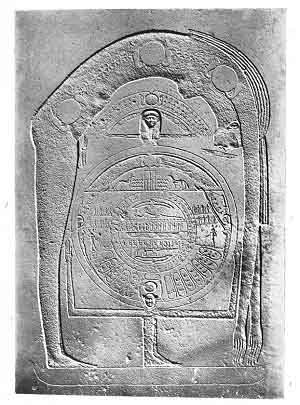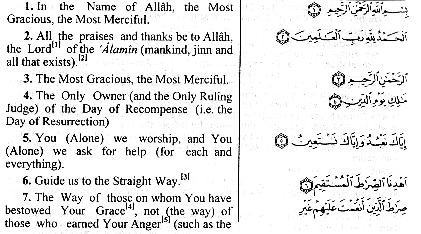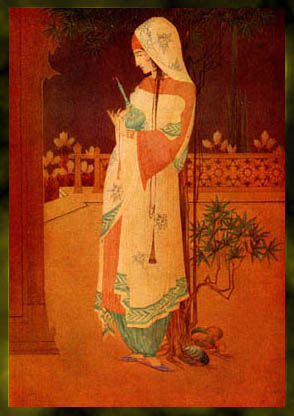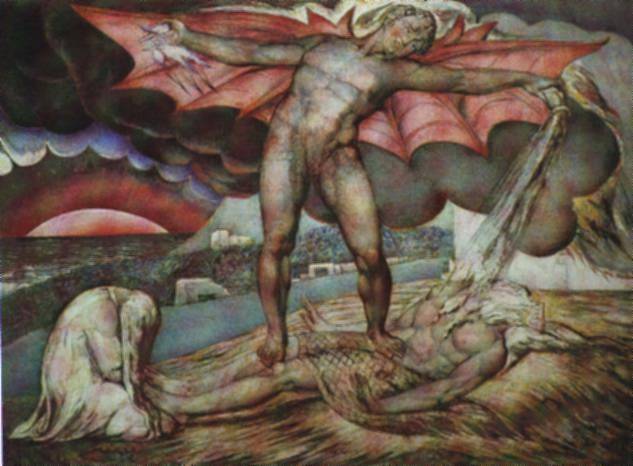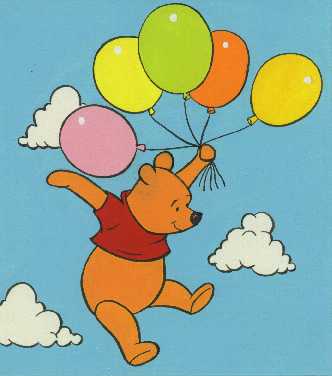Daily my head is filled with desire for your love.
Daily I'm restless, drunk with the wine of your love.
A drunkard drinks till he's drunk for all of a day.
I'm drunk on your love day after day after day.
#952: From Rumi's Kolliyaat-e Shams-e Tabrizi
I've just encountered an excellent article on Islam as seen from the institutional centre of Christianity (writers close to the Vatican). There is an original longish article in Italian published in the journal
STUDIUM, "The Islamic Question" by Roberto A.M. Bertacchini and Piersandro Vanzan S.I. This article is discussed and a long excerpt provided at the
chiesa website, "Oriana Fallaci Has Enrolled in the Society of Jesus" by Sandro Magister. Since that site has an English mirror, Magister's article and therefore also the excerpts from the STUDIUM article are provided in an English translation. It is an excellent summing up that takes in the theological aspects of the "clash of cultures" as well as the political, economic, and ideological.
The STUDIUM authors itemize the elements that confirm a "pan-Islamist program" to Islamize the Western and Christian world:
1. military attacks on Western interests launched from Muslim countries (from Morocco to Philippines, Chechnya to Egypt)
2. terrorism, starting with the first plane hijack in 1969 and Munich in 1972
3. anti-Zionism, whether through failed military campaigns or through oil-based blackmail (OPEC pressure to back Israel's opponents)
4. missionary activity, massively funded by Saudi Arabia
5. immigration, combined with high Muslim fertility rates and a strong assertion of their rights to express their religion, right down to sharia details
6. Islamic joy expressed on the street, in the media, and on the internet, over events like sep11 and Hurricane Katrina (described in a Kuwait daily as "a soldier sent by God")
I would certainly add to the last point a widespread admiration for Osama bin Laden, a hero-worship that comes through even from supposedly "moderate" Muslims.
In short, the Islamization of the West is neither a phantasm nor merely something feared: it is an intention and a fact that emerges from an objective examination of the evidence.
Moderate Islam, properly so called, does not exist because there is no institutional and moderate form of Islamic theology. There are moderate Muslims, and some of them see things with a clear and long-term perspective. But Islam itself, or rather the institutional religious culture of the Muslims, has reacted in its encounter with modernity by entrenching itself in fundamentalist positions. And this is true not only in Iran or Pakistan, but also in Egypt.
I found it interesting to discover that Arabic had no word for "freedom" during Islam's entire first millenium:
hurriyya meaning
entitlement was introduced in 1774, apparently simply through the necessity of signing treaties with Westerners. I searched through my own writing on Rumi and found this issue discussed under
a slavery that sets free, where Rumi identifies slavery with freedom. (Since most of his poems are in Farsi/Persian and not Arabic, the absence of a concept of freedom might not be so grave.)
The necessity for extensive self-criticism on relations with Islam, one that would finally emerge from a blind and suicidal "niceness," is therefore unavoidable.
Dialoguing with those who have, in the back of their minds, the idea of Islamizing us and reducing us to dhimmi status, as subjects of an inferior order, simply makes no sense. Dialogue with moderate Muslims should not only be pursued; it should be increased, and the moderates supported in every way possible, even more so than the support that was given to the anti-Soviet resistance. But these forms of openness must be combined with a politics of distrust and suspicion, which would tighten the net as much as possible and utterly discourage the presence of the Islamizers in Europe. These are, in fact, the ideological column of terrorism: you cannot fight the one without opposing the other.
Although I actually agree with this conclusion at a pragmatic level, I am saddened to think that this "politics of distrust and suspicion" needs to be advocated. This approach to others smells so strongly of the very sly and slimey posturing that is stereotypically associated with Arabs. The Quran is full of warnings not to trust non-Muslims and now here are respectable Catholic writers advising us to distrust Muslims in principal. And yet, however sad this may be, however much we are being sullied by this encounter, our moral hands are tied because there is no clear way to tell the two kinds of Muslim apart, the one who can live side by side with us and the one who would bully us into submission.
In order to enter the banquet, one must wear the wedding garment, which we must demand of those who knock on our door. It is a garment that makes acceptance dependant upon the observance of our laws. Otherwise we cannot prevent some mosques, centers of Islamic culture, and circuits of electronic preaching from cultivating hatred against us. And that’s just it, hatred – a sentiment toward which we have for too long shown a suicidal tolerance. It is a sentiment that renders social life impossible.
And anyway, it would be too sad if everything were to end this way. We should, instead, be the prophetic proponents of a phase of tolerance and integration.
I cannot but agree that hatred "renders social life impossible" but how do we realistically weed it out without practising gross intolerance, without setting Muslims aside as people who cannot be integrated? How do we "measure" hate? What are its signs and symbols? In Iran there are mullahs especially employed to spy on the citizenry and catch people behaving immorally (such as a child eating during the day in Ramadan or a girl with her veil slipping improperly). Will we also employ such hate detecting police? Do we have the right to interpret a black burqa as threatening and hate-expressing? (It feels like that to me but surely its meaning is what the woman professes it to be, even if she essentially lies when she says it is "innocent" or "religious" or "pious".)
Today’s Islam presents Europe with the problem of the civil recognition of its identity. This is a serious problem, which Christianity has not been able to present on its own behalf with the same forcefulness. Finding a solution on a basis of equity – of harmonizing and safeguarding the rights of all religious groups in the same way – will not be easy, but it is unthinkable that a Muslim minority would be granted the civil protection of its identity and the cultural recognition that the secularism sprung from the French Enlightenment presumes to withhold from the Christian majority.
That last sentence is bitter but true. Christianity has largely become the despised underdog in Western civilization. The bully or tyrant is not so much atheism or agnosticism but more simply a radical secularism that sees God as simply meaningless. It is almost as impious to talk about God today as it was to talk about sex a mere half century ago. The STUDIUM authors mention how Omar Khayyam was censured "for talking about wine and drunkenness". Here is Rumi doing the same today. If he's talking about "real" wine, then his talk is sinful to Muslims but makes perfect sense to a Western secularist. If the wine stands for Sufism, then it is an invitation to Islam and this is sinful to non-Muslims, especially those that see the eradication of Islam as the only solution (in contrast to the STUDIUM authors who piously hope for a difficult but not impossible reformation). If Rumi were alive today, he'd be loved - and hated - by both sides!
